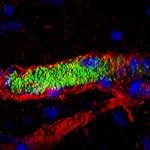Lien vers Pubmed [PMID] – 21615665
Cell. Microbiol. 2011 Aug;13(8):1114-21
In microbiology textbooks infectious agents are traditionally classified as intracellular or extracellular pathogens depending on whether they multiply inside or outside host cells. In recent literature an increasing number of extracellular pathogens are described in close apposition with the host cell surface embedded in plasma membrane folds, making it difficult to classify them as strictly extracellular pathogens. This review further explores this emerging new lifestyle category tentatively named ‘epicellular’ in reference to earlier work describing the location of the parasite Cryptosporidium parvum. The lifestyles of three diverse such pathogens were examined: the parasite Cryptosporidium parvum, the Gram-negative bacterium Neisseria meningitidis and the human T cell leukaemia virus type 1 (HTLV-1). The specific cellular location, the mechanisms of adhesion, the induction of plasma membrane folds and the subsequent functional consequences will be compared. Although current knowledge suggests different underlying mechanisms, a concept that emerges is that the particular location of these pathogens has important functional consequences for the pathogens in terms of nutrient acquisition, immune escape, resistance to mechanical stress and transmission. Re-examining the lifestyle of other classically extracellular pathogens might thus shed a new light on the way pathogens interact with cells and point to new areas of investigation.

